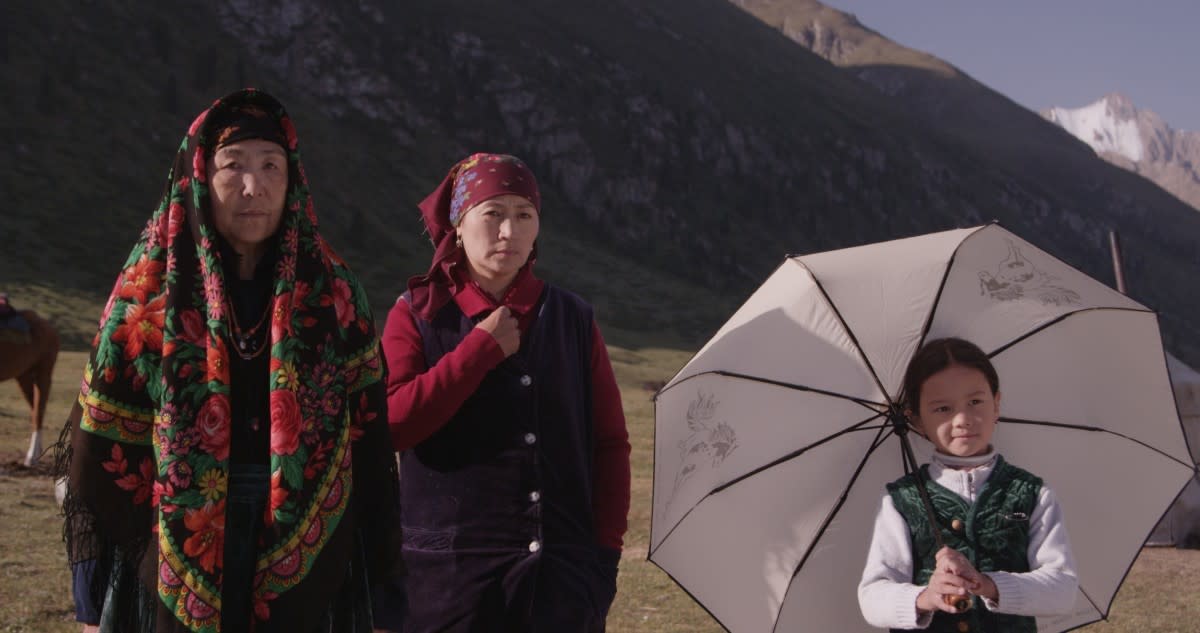Film Review: ‘Heavenly Nomadic’

Tradition and modernity gently clash as the cycle of life plays out for a horse-herding family living amid remote mountains in “Heavenly Nomadic,” the feature debut of Mirlan Abdykalykov, son of Kyrgyzstan’s best-known auteur, Aktan Arym Kubat (who helmed “The Swing,” “The Adopted Son” and “The Chimp” under his Russian name, Aktan Abdykalykov). Although this sweet-natured drama may seem simplistic compared to similar-themed Central Asian titles such as Sergei Dvortsevoy’s “Tulpan,” its visually majestic landscapes and ethnographic detail will entice fest programmers and niche arthouse distribs on the lookout for accessible exotica. The film won a nod from the Fedeora critics at Karlovy Vary.
Three generations of a nomadic family share a cozy yurt pitched on grassy plain surrounded by high peaks. Elderly herdsman Tabyldy (Tabyldy Aktanov) is the head of the household; his wife, Karachach (Anar Nazarkulova), does the cooking and looks after their cute-as-a-button 7-year-old granddaughter, Umsunai (Jibek Baktybekova), while their daughter-in-law, Shaiyr (Taalaikan Abazova), takes their herd to graze and performs the other heavy manual labor it takes to keep them in the horse-milk trade.
The absence of other men in the family is keenly felt. Shaiyr’s son Ulan (Myrza Subanbekov) is studying architecture in the city, much to Karachach’s disapproval, and her husband died some years ago, drowned in a mountain river while trying to save a foal. Tabyldy still grieves that he could not recover his son’s body for a proper burial and spends hours dragging stones from the river to build a memorial.
But another male does come into the picture: Ermek (Jenish Kangeldiev), a middle-aged meteorologist whose sudden liking for horse milk and friendship with Tabyldy arouses Karachach’s suspicion. Although Shaiyr is no longer young, she is still attractive, and Karachach fears that their daughter-in-law could leave them.
While the action is largely visual, helmer Abdykalykov provides exposition through dialogue scenes (the script was co-written by Kubat and Ernest Abdyjaparov) as the characters go about their business in the gorgeous landscape. Over dinner one night, Umsunai asks about the chirping call of the sutak (the bird that gives the film its original-language title) and why Abdykalykov responds to its call by putting out a dish of horse’s milk and asking for forgiveness. Karachach recounts a legend about the bird, which involves a wife suspected of sin just because she talked to another man. Shaiyr understands her insinuation. Umsunai, however, is more taken with her grandfather’s tale about a hunter turned into a hawk, who comes back to watch over his family.
The seasons change and Ulan returns for a visit. Calling him “our support and hope for the future,” Tabyldy presents him with a young stallion to tame, cuing a display of traditional Kyrgyz horse-handling skills. Although he can still ride and rope, it seems unlikely that Ulan will want to return to his family’s herding lifestyle. Meanwhile, city life as repped by bulldozers and building equipment is slowly but inevitably closing in on the nomads’ open landscape.
A film industry vet since the age of 8 as the star of three films directed by his father, helmer Abdykalykov draws touching performances from his actors. Perhaps the most poignant scenes show Tabyldy’s portent-filled dream and how he describes it to his wife the next day. The solid craft package fully exploits the impressive scenery.
Get more from Variety and Variety411: Follow us on Twitter, Facebook, Newsletter
